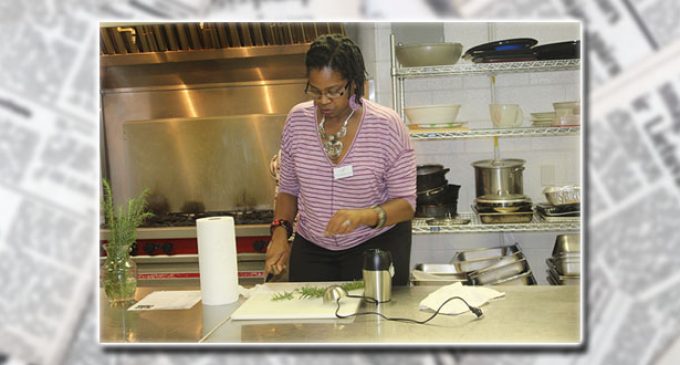Poor diet linked to illnesses among blacks

Cooking Matters (Right) coordinator Felecia Bennett-Giles chops fresh herbs during a recent Cooking Matters session. The class is designed to educate the African-American community on healthy eating.
Obesity and poor diet linked to cancer and hypertension, recent research shows
By Tevin Stinson
The Chronicle
This holiday season while we overindulge our favorite dishes and desserts, we must consider the impact on our health. Many social interactions during the holidays are centered around food. Unfortunately for the African-American community, soul food is not the healthiest of choices.
As obesity and chronic disease soar in many cultures around the world, African-Americans seem to be the hardest hit; 47.8 percent of African-Americans are obese, compared to 32.6 percent of whites. Overweight and obesity rates also tend to be higher among African-American children, with obesity rates increasing faster at earlier ages and with high rates of severe obesity as well.
Along with the weight disparities come other issues as well. Black people are twice as likely as white people to have a stroke and to be diagnosed with diabetes.
Many believe it is time for African-Americans to stop eating foods that have been known to cause hypertension, many of which have been staples in the community for years, such as processed meats, red meats, and pork.
Recent research has also proven that certain nutrients and foods increase your chance of being diagnosed with cancer. According to the American Cancer Society, poor diet and being inactive are two key factors that can increase a person’s cancer risk.
Cancer survivor John Ray said that once he stopped eating those types of foods, his health improved and he started to feel better as well.
“The African-American community as a whole has to do better,” he said. “I know many of us were raised on pork and fried foods, but it is time to leave those foods alone. They are slowly killing us.”
Ray also encourages the community to make regular trips to the doctor. He mentioned that if it wasn’t for a close friend forcing him to go to the doctor, he may not be alive today. “I was suffering from very bad stomach pains. I refused to go to the doctor because I didn’t think it was anything serious,” he continued. “When I finally did go, they diagnosed me with colon cancer. It was that day I realized how important going to the doctor really is.”
It has been proven that lower incomes and poverty correlate strongly with an increase in obesity since less nutritious, calorie-dense foods are often less expensive than healthier foods.
Cooking Matters, a six-week cooking class held at the Winston Lake YMCA and local churches, was designed to combat those issues in Winston-Salem and Forsyth County.
The class is sponsored by Cancer Services and is designed to teach members of the community how to cook healthy on a budget.
Outreach Educator Felecia Bennett-Giles said she started Cooking Matters because so many African-Americans are affected by chronic disease.
“It’s important to educate the community because so many of us suffer from diseases like diabetes and cancer,” she said. “I tell the participants if you eat healthy, you can add an extra 14 years to your life. I’m just trying to get people to eat better and think healthy.”
During a recent session held at Morning Star Baptist Church, 1400 Fitch Street, Nathan Wilkins said that after much persuasion from his wife, he decided it was time to change the way he has been eating for years.
“As a diabetic, I felt it was important to learn about eating healthy,” he continued. “I want to be healthy and live as long as I can.”
Here are a few tips to remember when shopping for groceries to prepare your holiday feast, as well as grocery shopping year ‘round.
*Make a list before you go shopping and stick to your list. This will help you avoid “impulse” buying, which often means picking up unhealthy foods.
*Avoid convenience foods like frozen dinners and “instant” foods, which will cost you more than making them on your own, and are likely to be less healthy than meals you prepare.
*Try drinking water instead of sodas. Not only is it healthier, it can save you money when you go out to eat.
*Don’t always plan your meals around meats. Instead, let your main course be whole grains, such as rice, or beans like bean soups and refried beans in wraps.
*If you have freezer space, purchase frozen vegetables, which are fresher and often cheaper than canned vegetables.
*Choose lean protein meats such as chicken, turkey, and seafood.
*Try making your own snacks and convenience foods at home.
*Read labels and follow serving sizes.
*Cook once, eat twice. (Freeze foods for later meals)
*Combine exercise with healthy eating.











